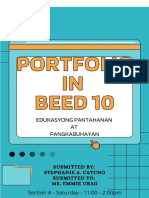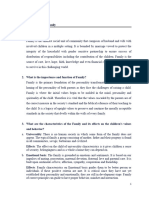Beniga Final-Maiii
Beniga Final-Maiii
Uploaded by
Rowena BenigaCopyright:
Available Formats
Beniga Final-Maiii
Beniga Final-Maiii
Uploaded by
Rowena BenigaOriginal Title
Copyright
Available Formats
Share this document
Did you find this document useful?
Is this content inappropriate?
Copyright:
Available Formats
Beniga Final-Maiii
Beniga Final-Maiii
Uploaded by
Rowena BenigaCopyright:
Available Formats
Name: ROWENA E.
BENIGA Date: OCTOBER 2,2020
Course/Year: MAED-ENG Teacher: DR. EMMALINA R.TABARANZA
MA III. Filipino Personality & Values: Its Implication to the School Organization
Final Examination
I. Fill in the blanks with appropriate answers.
1. Hospitality is a trait displayed by every Filipino that makes him legendary in Southeast Asia.
2. Family love is a genuine and deep love for family.
3. Catholicism is the predominant religion and the largest Christian denomination in the Philippines.
4. Philippine languages are often referred to by Filipinos as dialects.
5. Philippine cuisine consists of food preparation methods and eating customs found in the Philippines.
6. The Rise against hunger in the Filipino mind is a defense against hunger and old age, an eternal source of
food, clothing, and shelter.
7. The family code of the Philippines helps strengthen marriage and the family as basic social institution.
8. The Filipino culture includes Filipino traits and mannerisms, common beliefs, traditions, religion, languages,
clothing, food preferences and modes of dressing.
9. The Filipino value system refers to a set of values that a majority of Filipinos have historically held
important in their lives.
10. Filipinos rebuild their families along foundation of Christian spirituality.
11. The perfection of the nature of an object or subject is excellence.
12. Christianity was introduced to the Filipinos by the Spaniards.
13. Being optimistic in the typical sense of the word is defined as expecting the best possible outcome from
any given situation.
14.Right and wrong are ethical principles which man struggles to attain and implement in his daily life.
15. Pedagogy is that very special craft of knowing what or what not to say or do as a parent at the right time
when dealing with one’s child in order to construct and draw forth the best in the child.
16. The law that directs human behavior in his human acts is called Moral law.
17. Parent -child relationship is the vigorous and powerful interaction between parents and the children; the
parents as the first teachers on the first lessons in life.
18. Filipinos are hard working, the reason that encourages foreign employers to seek them for employment.
19. Bureaucracy is a foreign influence exhibited in the government where departments and divisions are
administered by lots of people.
20. Filipinos are resilient hence, they can bounce back from a tragedy and can still manage to smile and be
hopeful for a better tomorrow.
21. The 1987 Constitution declares Pilipino as the national language of the Filipinos.
22. Values Education as a part of the school curriculum is the process which values are formed in the learner
under the guidance of the teacher as he interacts with his environment.
23. Marriage is the foundation of the family and inviolable social institution governed by law.
24. The Filipino family is said to be patriarchal in authority, the father being the autocratic head.
25. We Filipinos are close family ties because we care for our family and kin at a level of closeness that is
rarely observed or practiced in other cultures or races.
Test II. Enumeration Type.
Direction: Enumerate the following.
1-5 Strong traits of a Filipino
1. Hospitable
2. Respectful
3. Strong family ties and religious
4. Generous and helpful
5. Hardworking
6-10 Primary functions of a Filipino family
6. Stable satisfaction of sex need
7. Reproduction or procreation
8. Protection and care of the young
9. Socializing functions
10. Provision of a home
11-14 Pillars of National Culture of Excellence
11. Personal integrity
12. Family solidarity
13. Civic responsibility
14. Universal charity
15-16 Models of Filipino Values
15. foreign model
16. traditional model
17-21 Dimensions of a human person
17. Mental/ Intellectual
18. Moral
19. Social
20. Economic
21. Political, Physical, Emotional and Spiritual.
22-26 Signposts of the National Culture of Excellence
22. quality instruction
23. community orientation
24. parental involvement
25. general well being
26. arts and culture
27-29 Elements of the Filipino Values System
27. Halaga
28. asal
29. diwa
30-35 Internal influences on the Filipino family.
30. Parental behavior
31. Parental absenteeism
32. Parental communication, behavior, tact and modesty
33. Moral relativism
34. Workaholism
35. Little mindedness of the parents
Test III. Discuss/explain briefly the following.
1. The ways and reasons why the Filipino family should be protected.
The Family Code of the Philippines recognizes a family constituted through the union of a man and a woman.
It classifies family relations as those between a husband and a wife, between parents and their children, and among
full or half-blood siblings. Since family is considered as the “foundation of the nation” and the basic unit of society, it
is the state’s responsibility to protect its welfare .Filipino Families should be protected to ensure safety and be free
from harassment , intimidation, fear, tampering, bribery, and abuse.
2. The importance of values education to the Filipino children as well as to the adults.
Values Education is one of the most important things that should be taught in home. As Filipinos we are all
known for our good characteristics. When we were still small, we are taught by our parents to give respect to elders,
love our brothers, sisters and family, have faith in God and always be kind to others. However, in our generation
today these traits are slowly fading. That's why it is important to practice values in our home. Values education are
very important in parenting since we parent deeply influence all behavior and attitudes that can affect
their whole being. Teaching our children good values gives us a powerful way to influence them and to
shield them from the adverse forces they may encounter in the outside world.Teaching values
education to our children we are able to raise a caring, responsible, well-disciplined and resilient
children.
3. The impact of parental role modeling on the moral development of the Filipino youth.
Parents play the big role in promoting children’s moral behaviors. Parents serve as role models
not only through direct interactions with their children, but through the example they set with their
attitude and behavior within the family and in the outside world. By addressing their concerns, sharing
their lives, and maintaining a constructive perspective, Parents can contribute to their children’s
personal growth and development. For instance , parents who show a willingness to interact with
others, and who focus on the richness of life that results from diversity, can help their children learn to
appreciate and respect cultural differences. And the best way to develop the child’s moral
development is that communication. We parent need to communicate with our children and stay active
in their lives. We need to take time to listen and share their concerns so they feel both loved and
respected.
4. The meaning, function and significance of the National Culture of Excellence to the government,
organizations and various sectors of the Filipino community.
National Culture of excellence refers to everything from the way people think and about the
organization and their colleagues to the rules for working together and the practices everyone uses to
be excellent and to do the work of the organization. The function of this is that to develop the personal
integrity, to promote the solidarity of a family, to become civic person, and a civic consciousness.
Prepared by:
EMMALINA R. TABARANZA, Ed. D.
Teacher
You might also like
- Roots and Wings, Revised Edition: Affirming Culture in Early Childhood ProgramsFrom EverandRoots and Wings, Revised Edition: Affirming Culture in Early Childhood ProgramsNo ratings yet
- Settlement AgreementDocument2 pagesSettlement AgreementGrace50% (4)
- Global Trends in Service ExcellenceDocument30 pagesGlobal Trends in Service ExcellenceRowena BenigaNo ratings yet
- What Is An Educated FilipinoDocument2 pagesWhat Is An Educated Filipinokheymi78% (9)
- Slowly Deteriorating and Fading Filipino ValuesDocument18 pagesSlowly Deteriorating and Fading Filipino Valuesreyamolo87% (15)
- Modern Filipino FamiliesDocument25 pagesModern Filipino FamiliesJasmin Caballero33% (9)
- Cima Ba4 2020Document96 pagesCima Ba4 2020Jonathan GillNo ratings yet
- Beniga Values Lesson ModuleDocument13 pagesBeniga Values Lesson ModuleRowena BenigaNo ratings yet
- Western Mindanao State University Ipil External Studies Unit Home Economics and Livelihood Education Course ModuleDocument4 pagesWestern Mindanao State University Ipil External Studies Unit Home Economics and Livelihood Education Course ModuleTrisha Cristi Ramos AlmoniaNo ratings yet
- Learning Activity Filipino ValuesDocument1 pageLearning Activity Filipino ValuesAllen Kurt RamosNo ratings yet
- LT 101 Course ModuleDocument43 pagesLT 101 Course ModuleRhelmilan BokingkitoNo ratings yet
- Research PaperDocument13 pagesResearch PaperAlerick VelascoNo ratings yet
- LEC - HANDOUT 6, Ethics, SENT TO STUDENTSDocument7 pagesLEC - HANDOUT 6, Ethics, SENT TO STUDENTSJeneline GonzalesNo ratings yet
- CWTS 1 M6 W5Document6 pagesCWTS 1 M6 W5Clark RefuerzoNo ratings yet
- wk19 FILIPINO CULTURE - VALUES 2Document39 pageswk19 FILIPINO CULTURE - VALUES 2claire yowsNo ratings yet
- Gec 6Document3 pagesGec 6Mark FillartosNo ratings yet
- Epp Portfolio (Catcho)Document15 pagesEpp Portfolio (Catcho)Stephanie CatchoNo ratings yet
- LEARN MAT ETH 101 TOPIC 1 FILIPINO WAY UNIVERSAL VALUES 2022-2023 2ND SEM (For Sending) (20230310092436)Document8 pagesLEARN MAT ETH 101 TOPIC 1 FILIPINO WAY UNIVERSAL VALUES 2022-2023 2ND SEM (For Sending) (20230310092436)Marian Kyla MarianoNo ratings yet
- The Profile of A Farmer by Federico O. Perez IDocument7 pagesThe Profile of A Farmer by Federico O. Perez IDianeNo ratings yet
- Lesson 3 Module 3: Values Development For Citizenship TrainingDocument5 pagesLesson 3 Module 3: Values Development For Citizenship TrainingAnamae Detaro DarucaNo ratings yet
- The Filipino Family and Its Influence On Business EthicsDocument7 pagesThe Filipino Family and Its Influence On Business EthicsJohn Francis SegarraNo ratings yet
- Written Report AbelgasDocument6 pagesWritten Report AbelgasAngelou Bon YatongNo ratings yet
- ReflectionDocument2 pagesReflectionEpifanio g. Domingo Jr.100% (7)
- Module 2 Ni Mame May Sagot NaDocument16 pagesModule 2 Ni Mame May Sagot NaReuel RavaneraNo ratings yet
- Sam-It, Donald P. Bsac 2Document5 pagesSam-It, Donald P. Bsac 2Huwei WangNo ratings yet
- M. Moral Recovery Program Building A PeopleDocument2 pagesM. Moral Recovery Program Building A Peoplejhaymagtibay0690No ratings yet
- Filipino CultureDocument23 pagesFilipino CultureMaria Sarah E. Villanueva100% (1)
- Chapter 3 - Values Development for Citizenship TrainingDocument30 pagesChapter 3 - Values Development for Citizenship TrainingMark Ryan Soñas100% (1)
- Assignment 3Document7 pagesAssignment 3Maria Virginia VirayNo ratings yet
- BSHM 85 Chapter 2 Key Features of CultureDocument36 pagesBSHM 85 Chapter 2 Key Features of Cultureshiene.salonNo ratings yet
- Term PaperDocument8 pagesTerm Papern66535011No ratings yet
- Lecture 4 NSTP1Document13 pagesLecture 4 NSTP1DARIUS DAVE CRUZNo ratings yet
- Q4 BUSINESS ETHICS SLHT 12combinedDocument7 pagesQ4 BUSINESS ETHICS SLHT 12combinedjoyceilustrisimodesabilleNo ratings yet
- The Teacher and The Community School Culture and Organizational LeadershipDocument18 pagesThe Teacher and The Community School Culture and Organizational LeadershipShanea VillaniaNo ratings yet
- EDTCOL Lesson 4Document5 pagesEDTCOL Lesson 4Kristi Louise DionelaNo ratings yet
- Ss103 Module.01Document9 pagesSs103 Module.01CLARETE AlbertNo ratings yet
- Chapter IVDocument22 pagesChapter IVforiohoneyNo ratings yet
- Roots of The Filipino Character: 1.the Family & Home EnvironmentDocument5 pagesRoots of The Filipino Character: 1.the Family & Home EnvironmentApostol AngelycaNo ratings yet
- CHN Group 5 - BSN 2-2Document33 pagesCHN Group 5 - BSN 2-2Nicole LantinNo ratings yet
- Module 2Document15 pagesModule 2Jemuel Nacionales CruzNo ratings yet
- Roots of The Filipino CharacterDocument4 pagesRoots of The Filipino CharacterMary Grace Angeles100% (4)
- Filipino Character and Universal ValuesDocument55 pagesFilipino Character and Universal ValuesChristine LogdatNo ratings yet
- Values Development For Citizenship TrainingDocument7 pagesValues Development For Citizenship Trainingrovic velascoNo ratings yet
- 003 NSP 101Document10 pages003 NSP 101Elsie TabangcuraNo ratings yet
- Module 3Document2 pagesModule 3Rogena CabolaoNo ratings yet
- Population and Quality of Life Society'S Norms Regarding The Value of ChildrensDocument14 pagesPopulation and Quality of Life Society'S Norms Regarding The Value of ChildrensAbigail BascoNo ratings yet
- Lesson 7Document6 pagesLesson 7Mary Keith GonzalesNo ratings yet
- 1Document1 page1Kathleen BigtasNo ratings yet
- Ethics Module Lesson5Document9 pagesEthics Module Lesson5Cristine Mae Pregunta100% (1)
- Modules For Cahoa SpdaDocument7 pagesModules For Cahoa Spdachristeentomale1207No ratings yet
- Changing Roles of Filipino FamilyDocument49 pagesChanging Roles of Filipino FamilyNiala AlmarioNo ratings yet
- Filipino Influences Traits and CharacteristicsDocument18 pagesFilipino Influences Traits and CharacteristicsAruba De La CruzNo ratings yet
- 2sedf A Group 1 Ethics101 Filipino Way Universal Values 2Document37 pages2sedf A Group 1 Ethics101 Filipino Way Universal Values 2RONEL AligamNo ratings yet
- Test Questions - Ucsp - 1ST PrelimsDocument5 pagesTest Questions - Ucsp - 1ST Prelimszosima.abalos001No ratings yet
- Values and the FamilyDocument4 pagesValues and the FamilyGLITZNo ratings yet
- Instittte of PHLPPN Cltr's Stdy PHLPPN On Vls - Group - 6 - DissDocument32 pagesInstittte of PHLPPN Cltr's Stdy PHLPPN On Vls - Group - 6 - DissfamilyescapadeNo ratings yet
- Group of People Who Have Come Together For A Common PurposeDocument26 pagesGroup of People Who Have Come Together For A Common PurposeAngelo ArabejoNo ratings yet
- Assessing the Advantages and Disadvantages of Filipino Extended Family OfficeDocument2 pagesAssessing the Advantages and Disadvantages of Filipino Extended Family OfficemaiacNo ratings yet
- Individual Assg Home Project & VisitationDocument6 pagesIndividual Assg Home Project & VisitationHanna MonanaNo ratings yet
- The Filipino Cultures and Beliefs and Why Is It ImportantDocument5 pagesThe Filipino Cultures and Beliefs and Why Is It ImportantJohn Michael SorianoNo ratings yet
- PLT 8. AnswersDocument5 pagesPLT 8. Answersdelight Baydon DumalyongNo ratings yet
- Premid Exam Sir Paul ElpedesDocument8 pagesPremid Exam Sir Paul ElpedespilihinyrioNo ratings yet
- Preparing for Life: How to Help One's Children Become Mature and Responsible AdultsFrom EverandPreparing for Life: How to Help One's Children Become Mature and Responsible AdultsNo ratings yet
- ReadingDocument11 pagesReadingRowena BenigaNo ratings yet
- SpeakingDocument9 pagesSpeakingRowena BenigaNo ratings yet
- Grammar AwarenessDocument14 pagesGrammar AwarenessRowena BenigaNo ratings yet
- Supervisory CornerDocument1 pageSupervisory CornerRowena BenigaNo ratings yet
- Beniga Ma 102 Pre-Test ExamDocument6 pagesBeniga Ma 102 Pre-Test ExamRowena Beniga0% (1)
- Outputs ChecklistDocument5 pagesOutputs ChecklistRowena BenigaNo ratings yet
- Beniga Bmi-Grade 10 Section2Document2 pagesBeniga Bmi-Grade 10 Section2Rowena BenigaNo ratings yet
- Test QuestionaireDocument8 pagesTest QuestionaireRowena BenigaNo ratings yet
- Bow Mathematics 7 10Document28 pagesBow Mathematics 7 10Rowena BenigaNo ratings yet
- Math 10 Summative TestDocument2 pagesMath 10 Summative TestRowena BenigaNo ratings yet
- Ethical LeadershipDocument3 pagesEthical LeadershipMarvin LapuzNo ratings yet
- Olymp Trade AgreementDocument4 pagesOlymp Trade Agreementpaulbecky723No ratings yet
- UNI 2 - SEM 3 - CourseraDocument2 pagesUNI 2 - SEM 3 - CourseraPaul Bances SeverinoNo ratings yet
- Ch. 1 Social ResponsibilityDocument14 pagesCh. 1 Social ResponsibilityMigabrael Herrera LeonorNo ratings yet
- AWARD - 35128 (Fixed Term Contract - Awarded)Document11 pagesAWARD - 35128 (Fixed Term Contract - Awarded)Oliver JenkinsNo ratings yet
- The Human Person in His Environment NotesDocument3 pagesThe Human Person in His Environment NotesGreeiah June LipalimNo ratings yet
- MPU2193 PCI QuizDocument9 pagesMPU2193 PCI QuizDerrick Yu Ze HangNo ratings yet
- SF 9 Report Card AutomatedDocument27 pagesSF 9 Report Card AutomatedDaryl OribiadaNo ratings yet
- (Week 1) Intro. To Philo. Q2Document12 pages(Week 1) Intro. To Philo. Q2Harold Jed Hernandez100% (1)
- Constructive and Destructive Feedback NotesDocument5 pagesConstructive and Destructive Feedback NotesSaisanthosh Kumar SharmaNo ratings yet
- Humanoid Robots Replacing Nurses in The Clinical PracticeDocument4 pagesHumanoid Robots Replacing Nurses in The Clinical PracticeJade Lagada PagariganNo ratings yet
- PE - Unit - 4 - Ethical Decision - Making in BusinessDocument13 pagesPE - Unit - 4 - Ethical Decision - Making in BusinessShalin Sirwani100% (4)
- Nsi VerificationDocument3 pagesNsi Verificationproshenjitsaha555No ratings yet
- Applied Positive PsychologyDocument20 pagesApplied Positive PsychologyPaul David100% (2)
- Patent Filing Procedure - IndiaDocument41 pagesPatent Filing Procedure - Indiaraj9999999No ratings yet
- Types of Managers and Management Styles: Popmt@uoradea - Ro Dpop@uoradeaDocument7 pagesTypes of Managers and Management Styles: Popmt@uoradea - Ro Dpop@uoradeaJimnadominicNo ratings yet
- Merry, Sally. "Legal Pluralism". Law Society Review, Vol. 2 No. 5 (1998), Pp. 869-896Document29 pagesMerry, Sally. "Legal Pluralism". Law Society Review, Vol. 2 No. 5 (1998), Pp. 869-896Alessandro Rodríguez ChavesNo ratings yet
- Essay For BeginnerDocument2 pagesEssay For BeginnerIsmail ZakariaNo ratings yet
- Professional Accounting Ethics Chapter 2Document4 pagesProfessional Accounting Ethics Chapter 2Indah Safhira100% (1)
- Geceth-18 - Ethics - m2 and m3Document9 pagesGeceth-18 - Ethics - m2 and m3Chrisse Josephinee A. RedNo ratings yet
- Abhi 01Document67 pagesAbhi 01api-19832205No ratings yet
- 6 Stages of Moral DevelopmentDocument10 pages6 Stages of Moral DevelopmentMW-2D Angel Mar C. BersabalNo ratings yet
- Kelvin Cantillo Gutiérrez: Professional SummaryDocument1 pageKelvin Cantillo Gutiérrez: Professional Summarykelvin cantilloNo ratings yet
- Topic Guide 2 2018Document14 pagesTopic Guide 2 2018Lila EsauNo ratings yet
- Letter Writing RulesDocument4 pagesLetter Writing RulesBogdan100% (1)
- I Choose You by Sara BareillesDocument9 pagesI Choose You by Sara Bareillesboo fxNo ratings yet
- Expression Care and SympathyDocument8 pagesExpression Care and SympathySilvia Damayanti PuspaningrumNo ratings yet
- L11 Works-WOMIndolenceDocument37 pagesL11 Works-WOMIndolenceJoshua PinedaNo ratings yet




































































































